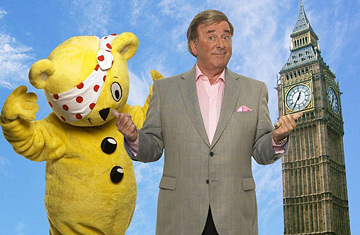
At least six BBC programs have breached editorial standards by faking phone-ins.
Known in Britain simply as "Auntie," the British Broadcasting Corporation has guided the country through wars and social convulsions with the steady hand of a trusted relative. But now this 85-year-old pillar of British society finds itself at the center of a widening scandal that threatens its worldwide reputation for accuracy and impartiality — and not for the first time.
Yesterday, senior BBC executives went before a House of Commons committee to discuss revelations of viewer deception and editorial misconduct, including phone-in trivia competitions in which the BBC encouraged viewers to call in answers — only to award the prize to an employee posing as an enthusiastic contestant.
Three of eight bogus competitions uncovered in internal reviews were in support of charity — Comic Relief, Sport Relief and Children in Need — and one, Blue Peter, was a children's show.
In a separate, widely-publicized incident, a promotional clip for a BBC television documentary on Queen Elizabeth manipulated footage to make it appear that the monarch walked out in a huff from an Annie Leibovitz photo-shoot. (The producer of the independent film company commissioned to make the documentary has since resigned, although his production company has refused to accept his resignation.)
The current scandal involving phone-in competitions broke after similar revelations from another public broadcast television channel, ITV. But the BBC holds an exalted place in British society because it receives public subsidy from viewers — Brits must pay $280 a year for a "license" to watch television — specifically designed to protect its two national channels (plus a range of digital channels) from competitive pressures and rating wars.
"It is totally unacceptable and it goes to the heart of what the BBC stands for, which is trust, accuracy and openness," BBC deputy director general Mark Byford told the Commons committee. "We are the most trusted broadcaster in Britain; what we can't have is very damaging incidents like this."
Most of the staged phone-in competitions occurred when phone lines failed during live broadcasts and staff decided to stage winners rather than reveal the technical glitch, a BBC spokesman said. However, one program, a cooking show made by an independent production company, asked viewers to phone in to vote for a dish they would like to see prepared even though the program was recorded.
"What we have to make absolutely clear to all our staff is, 'when in doubt, don't do it…better to go off the air [than be deceitful]," Mr Byford added.
In response to the crisis, the BBC announced last week the appointment of an editorial standards board to oversee programming and the creation of an independent inquiry into the misleading footage of the Queen. Around 16,500 staff will also undergo mandatory training in the standards of the BBC.
But Tuesday's hearing, designed as a sort of theatre and described by the former BBC head Michael Grade as a "catharsis," was still a public embarrassment for the BBC executives, whose testimony interspersed contrition with the obfuscating language of the very politicians their hardened journalists are supposed to hound: "We asked people to step aside who may have knowingly known," Mr Byford told members of parliament, in a redundancy he used more than once.
Speaking before the hearing, David Jordan, the BBC's Controller of Editorial Policy, told TIME that the BBC's review of its practices would be thorough, and may uncover further instances of malpractice as "[the BBC] discover[s] what other skeletons might still be in our closet". In 2004, a British judicial inquiry scrutinized a controversial BBC report of a year earlier that claimed the British government had deliberately overstated Iraq's nuclear capability. After the inquiry concluded that "the editorial system which the BBC permitted was defective," the BBC's chairman and director general both resigned.
Whatever further revelations emerge this time around, Britain's confidence in its national broadcaster has been shaken, and public grumbling over television license fees is bound to gain in volume. When the BBC introduced television shows alongside its stalwart radio broadcasts in 1936, it promised a new world in entertainment. But for BBC watchers, despite the fantastical nature of the medium, television was never meant to be make-believe.
